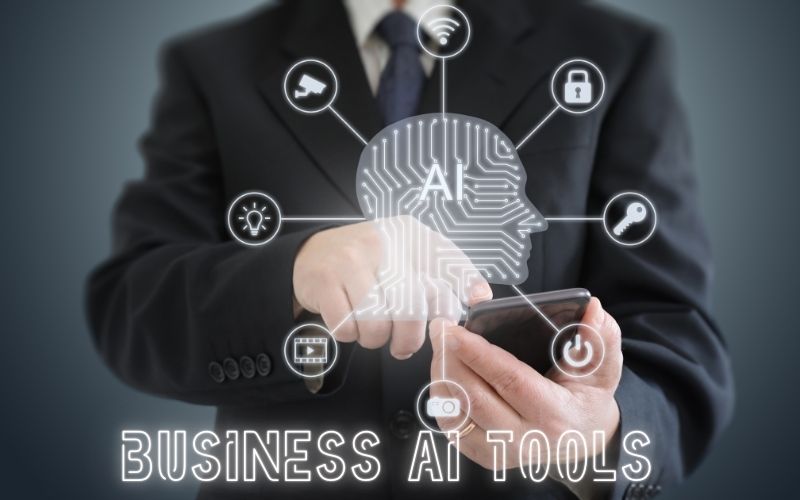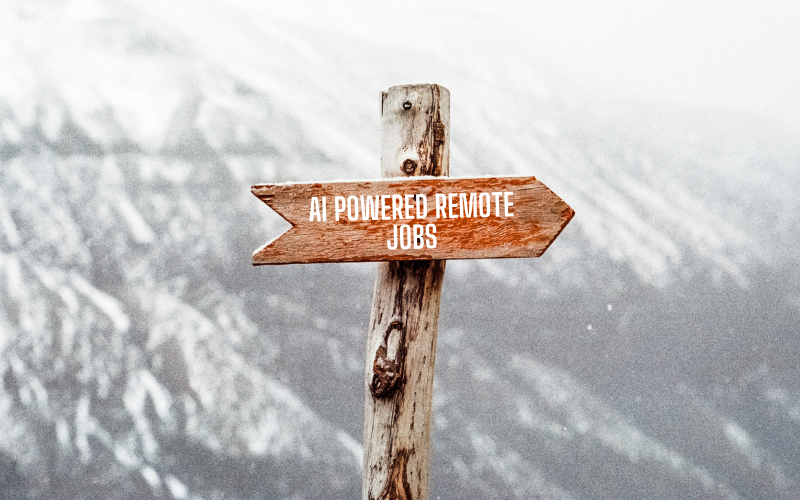Artificial Intelligence (AI) has revolutionized various industries, including the realm of remote work. As technology continues to advance at an unprecedented pace, remote workers are increasingly encountering AI in their daily tasks. From automated processes to data analysis, AI is transforming the way we approach remote jobs and presenting both challenges and opportunities.
Table of Contents
ToggleImplications of AI in Remote Jobs
One of the key implications of AI in remote jobs is automation. AI-powered tools and platforms streamline repetitive tasks, freeing up remote workers’ time to focus on more critical and strategic aspects of their job. For instance, chatbots can handle customer inquiries, while machine learning algorithms can analyze large datasets to extract valuable insights. Automation not only increases efficiency but also allows remote workers to take on more complex and fulfilling responsibilities.
Another significant impact of AI in remote work is the potential for personalized experiences. AI algorithms can analyze data from multiple sources to understand individual preferences, providing personalized recommendations and insights. For remote workers, this means having access to tailored resources, training programs, and professional development opportunities. Through AI-powered platforms, remote workers can enhance their skills and knowledge, ultimately improving their performance and career prospects.
However, despite the many advantages, the rise of AI in remote jobs also poses several challenges. One of the main concerns is the fear of job displacement. As AI continues to evolve, there is a risk that certain tasks performed by remote workers could be completely automated. This raises concerns about job security and the need for upskilling to remain relevant in the AI era. Remote workers must adapt by acquiring new skills and knowledge that align with the changing demands of the workforce.
Closely related to the challenge of job displacement is the increased competition in the remote job market. With AI streamlining processes and improving efficiency, companies may rely more on remote workers, leading to a larger pool of talent competing for the same opportunities. Remote workers must stay proactive and continuously develop their skills and expertise to stand out in a crowded job market.

The Impact of AI on Job Opportunities in Remote Work
The rapid advancements in artificial intelligence (AI) have had a profound impact on various industries, including remote work. As AI continues to evolve, it has opened up new opportunities for remote jobs while also presenting unique challenges. In this article, we will explore how AI has influenced job opportunities in remote work and discuss the implications it has for professionals in this field.
One of the key ways that AI has affected remote work is by automating certain tasks and processes. With the help of AI-powered tools and technologies, businesses can now streamline their operations and reduce the need for manual labor. This, in turn, has resulted in the creation of new job roles that focus on managing and optimizing AI systems. Remote workers with the necessary skills and expertise in AI can capitalize on these emerging opportunities and find fulfilling careers in this field.
Additionally, AI has facilitated the growth of remote jobs by enabling more efficient communication and collaboration. With the rise of virtual meeting platforms, AI-powered chatbots, and project management tools, remote teams can now work seamlessly across different time zones and locations. This has not only increased the availability of remote jobs but has also enhanced productivity and efficiency in remote work environments.
However, along with the opportunities, there are also challenges that remote workers face in the AI era. One of the main concerns is the potential job displacement caused by automation. As AI continues to develop, certain tasks that were previously performed by humans may become obsolete. Remote workers need to adapt to this changing landscape by upskilling and reskilling to ensure their continued relevance in the job market.
Another challenge is the potential for AI to create a sense of isolation among remote workers. While technology has made it easier than ever to connect virtually, the absence of face-to-face interaction can lead to feelings of loneliness and disconnection. Remote workers must actively find ways to combat these challenges by leveraging AI tools for virtual team building activities and fostering a sense of community within remote teams.
To thrive in an AI-driven environment, remote workers should focus on acquiring skills that complement AI technologies rather than competing with them. This includes developing critical thinking, problem-solving, and creativity skills, which are currently irreplaceable by AI. By nurturing these human-centric skills, remote workers can position themselves as invaluable assets in the face of technological advancements.

Strategies for Thriving in an AI-driven Environment while Working Remotely
In today’s digital age, the rise of artificial intelligence (AI) has significantly impacted the way remote work is conducted. As AI continues to advance, it presents both challenges and opportunities for remote workers. To navigate this evolving landscape successfully, remote workers must adopt strategies that allow them to thrive in an AI-driven environment.
Embrace Lifelong Learning: As AI technology continues to evolve, it is crucial for remote workers to stay updated with the latest trends and developments. Embracing lifelong learning will help them acquire new skills and adapt to the evolving demands of remote jobs. Online learning platforms, webinars, and industry conferences provide valuable opportunities for skill development and networking.
Cultivate Collaboration and Communication Skills: While AI can automate certain tasks, human interaction and collaboration remain essential in a remote work setting. Remote workers should focus on cultivating strong collaboration and communication skills to effectively work with AI tools and technologies. Effective communication fosters teamwork, innovation, and problem-solving.
Leverage AI Tools: Rather than perceiving AI as a threat, remote workers should embrace it as a valuable tool that can enhance their productivity and efficiency. AI tools such as project management software, virtual assistants, and data analytics platforms can streamline remote work processes and help workers perform their tasks more effectively. Familiarizing oneself with these tools and staying updated with AI advancements can be a significant advantage.
Adapt and Evolve: AI technology is reshaping industries and job roles rapidly. Remote workers should be open to adapting and evolving their skill sets to remain competitive. Upskilling or reskilling in areas that complement AI technology, such as data analysis, programming, or AI ethics, can open new opportunities for remote workers and help them stay relevant in an AI-driven environment.
Maintain a Human Touch: While AI can automate certain tasks, it cannot replace the human touch and emotional intelligence. Remote workers should prioritize maintaining personal connections with colleagues, clients, and stakeholders. Regular video conferences, virtual coffee breaks, or team-building activities can help foster a sense of camaraderie and maintain a human element in remote work.
Balance Work and Well-being: Remote work in an AI-driven environment can sometimes blur the boundaries between work and personal life. Remote workers should set clear boundaries, establish a dedicated workspace, and practice self-care to prevent burnout. Prioritizing well-being ensures that remote workers can maintain their productivity and optimize their performance.

The Future of Remote Jobs with Advancements in AI Technology
Advancements in artificial intelligence (AI) technology are revolutionizing various industries, and remote work is no exception. Remote jobs have gained tremendous popularity over the years due to their flexibility and convenience. With the integration of AI, these opportunities are expected to expand and evolve further, presenting both challenges and opportunities for remote workers.
One of the main challenges that remote workers may face with the rise of AI technology is automation. AI has the potential to automate repetitive tasks and streamline processes, which could potentially replace certain roles that were traditionally performed by humans. However, this does not mean that AI will completely eliminate remote jobs. Instead, it will require remote workers to adapt and upscale their skills to stay relevant in an AI-driven environment.
While AI may take over certain tasks, it also opens up new opportunities for remote workers to engage in more complex and creative roles. As AI automates routine and mundane tasks, remote workers can focus on higher-level responsibilities, such as decision-making, problem-solving, and innovation. This shift can enhance job satisfaction and provide remote workers with a greater sense of fulfillment in their roles.
In addition to creating new job opportunities, AI can also improve the quality and efficiency of remote work. With AI-powered tools and platforms, remote workers can access advanced analytics, virtual collaboration tools, and performance tracking systems that enhance productivity and facilitate seamless remote work experiences. These technological advancements can enable remote workers to effectively communicate and collaborate with team members, regardless of their physical locations.
Furthermore, AI has the potential to address some of the most significant challenges faced by remote workers, such as isolation and lack of personal interaction. AI-powered chatbots and virtual assistants can offer companionship and support, helping remote workers feel more connected and engaged in their work. Additionally, AI can facilitate personalized learning and development opportunities, empowering remote workers to acquire new skills and stay competitive in the job market.
While the future of remote jobs in the AI era holds immense potential, it is crucial for remote workers to embrace continuous learning and professional growth. As AI technology continues to advance, remote workers should proactively seek opportunities to upskill and reskill themselves to remain valuable within their respective industries. This might involve enrolling in online courses, attending virtual conferences, or joining professional communities that provide resources and networking opportunities.
Wrapping up
As remote work continues to gain prominence, the integration of AI technology brings both opportunities and challenges for remote workers. The definition and implications of AI in remote jobs have reshaped the landscape of employment, enabling tasks to be automated and improving efficiency. However, this also means that certain job opportunities may be at risk of being replaced by AI. As we navigate this new era, remote workers must not only adapt to the changing job market but also overcome the challenges that come with it.
The impact of AI on job opportunities in remote work cannot be ignored. AI has the potential to automate repetitive tasks and streamline processes, which can lead to increased productivity and reduced costs for businesses. While this may provide new prospects and roles, there is also the concern that some jobs may become obsolete in the face of AI advancements. As remote workers, it is essential to stay ahead of the curve by upskilling and diversifying our skillsets to remain competitive in the job market.
Yet, challenges arise for remote workers in the AI era. Communication and collaboration become increasingly vital as teams may consist of both humans and AI-powered systems. The ability to cohesively work with AI technologies and leverage their capabilities is a new skill that remote workers must acquire. Additionally, maintaining work-life balance can prove to be challenging as the lines between work and personal life blur, with the convenience of technology allowing work to be done anytime and anywhere. Remote workers must find effective ways to disconnect and recharge to avoid burnout.
To thrive in an AI-driven environment, remote workers must adopt strategies that enable them to harness the benefits of AI while staying relevant and competitive. Continuous learning and upskilling are crucial to adapt to the evolving job market. By acquiring new skills and staying updated with the latest technological advancements, remote workers can remain valuable assets to their employers. Additionally, building strong relationships with other remote workers through online communities and networking events can provide support and foster collaboration.
Looking to the future, the role of AI in remote jobs is only expected to grow. Advancements in AI technology will continue to impact the way we work, opening up new possibilities and challenges along the way. The evolution of AI systems will likely require remote workers to adapt once more, embracing new technological tools, and aligning their skills to complement the capabilities of AI. The future of remote jobs lies in the ability to find the perfect balance between human expertise and AI efficiency.
In conclusion, the integration of AI in remote jobs presents a plethora of challenges and opportunities. While AI has the potential to streamline processes and enhance productivity, it may also pose a threat to certain job roles. Remote workers must adapt by upskilling, developing new competencies, and building strong relationships with their peers in order to thrive in an AI-driven environment. With advancements in AI technology, the future of remote jobs will require constant learning and a harmonious collaboration between human intelligence and AI efficiency. By embracing these changes, remote workers can navigate the challenges and leverage the opportunities that arise in an AI-powered world.










